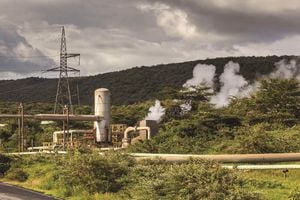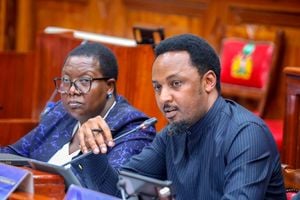
The total expenses for the five energy projects awarded to the company affiliated to Indian billionaire Gautam Adani (pictured) are higher than the government’s previous estimated cost by Sh33.5 billion ($260.6 million).
The total expenses for the five energy projects awarded to the company affiliated with Indian billionaire Gautam Adani are higher than the government’s previous estimated cost by Sh33.5 billion ($260.6 million), documents seen by Sunday Nation show.
An analysis of various official reports by the Kenya Electricity Transmission Company (Ketraco), which entered into a deal with Adani Energy Solutions for the Indian multinational to build and operate three transmission lines and two sub-stations, shows that in 2023 Ketraco valued the five projects at around $475.38 million (Sh61.2 billion).
On Friday, Energy and Petroleum Cabinet Secretary Opiyo Wandayi announced that Ketraco and Adani Energy Solutions had inked a deal that would see the Indian conglomerate build and operate the five projects at a total cost of Sh95.68 billion ($736 million) for 30 years before handing it back to Kenya.
The total cost at the end of the project, the 30 years provided and checks to avoid the kind of corruption linked to previous energy deals remain some of the lingering questions.
In its Transmission Masterplan for the period between 2023 and 2042, Ketraco provides an estimated cost for all the transmission lines and sub-stations to be built in the next 20 years in a bid to stabilise power supply.
Variation of figures
However, Ketraco’s Managing Director John Mativo told Sunday Nation the variation was because the figures contained in the Transmission Masterplan only focus on Engineering, Procurement and Construction (EPC) costs.
“But you know Adani came in as an investor. Apart from the EPC costs, there are wayleaves, taxes, project development, project management and cost of insurance,” said Dr Mativo.
He said Ketraco will have visibility on the costs and “there is no incentive for them (Adani) to cheat”.
The statement issued by CS Wandayi did not give a breakdown of the cost of each project.
However, in Ketraco’s Transmission Masterplan seen by Sunday Nation, the 400kV Gilgil-Thika-Malaa-Konza Line is estimated at $262.59 million (Sh33.82 billion), the Rongai-Kerenget-Chemsoit at $100 million (Sh12.8 billion), and the 70km 132kV Menengai-Ol Kalou-Rumuruti at $34.34 million (Sh4.42 billion).
Construction of the 132/33kV substation at Thurdibuoro in Kisumu, together with transmission lines to serve the Central and Southern Nyanza regions, was estimated at Sh3.53 billion.
Ketraco had put the cost of building the Rongai substations at $18.85 million (Sh2.43 billion) and $32.16 million (Sh4.14 billion) for the one in Lessos.
Ketraco explained that the project costs include engineering, construction, wayleave acquisition, taxes, project development, project management, insurance, financing, success fees and legal costs.
Dr Mativo disclosed that Adani’s Engineering, Procurement and Construction costs were still higher than Ketraco’s by 12 per cent, or approximately $46 million (Sh5.92 billion).
Increased blackouts
“My team is very confident that the cost will come down,” said Mr Mativo, adding that Adani Solutions had started with a total cost of $1,104 million (Sh142.2 billion) before they negotiated downwards to $736 million.
These energy projects, together with others by Africa50, are Privately Initiate Projects (PIPs). PIPs are part of the Public Private Partnership (PPP) alternative financing model through which development projects are conceived, financed, and implemented by private entities, often with some level of government support or involvement.
Ketraco, which was established in 2008, says that it needs PPP financing of close to Sh100.89 billion in the period between 2023 and 2027 as the country tries to stabilise its power grid which has been characterised by increased blackouts due to weak and ageing transmission lines.
Alternative financing
The administration of former President Uhuru Kenyatta increased the country’s power output mostly using borrowed money. But with the country at risk of defaulting, officials have justified the move to alternative financing models such as PIPs to continue investing in its power infrastructure.
However, the implementation of the PIPs is turning out to be unpopular as they do not follow the conventional competitive procurement methods.
A National Treasury document notes that most of the projects in water and irrigation are being prepared as PIPs.
In the energy projects, two projects under PIPs, include the plan by Adani Energy Solutions to do three transmission lines and two sub-stations which the Exchequer had estimated at $907 million (Sh129.3 billion). These projects are said to be in the development phase.
The other energy PIP was $313.25 million (Sh44 billion) to build two transmission lines by Africa 50, an affiliate of the African Development Bank.
Yet another PIP by an Adani-affiliated company to lease the Jomo Kenyatta International Airport (JKIA) has elicited mixed reactions among Kenyans, with employees of the region’s largest airport going on strike to oppose the takeover.
Besides the implications of the Indian conglomerate, Adani Group, in various scandals, the PIP has also been opposed for not being competitively sourced. The government insists Adani is yet to be handed the deal.
Wandayi hails pact
Issues of transparency and accountability have also been raised as Section 88 (3) of the PPP Act provides for regular reporting to Parliament by the Cabinet Secretary for National Treasury of project lists under consideration for funding through the PPP framework.
Mr Wandayi hailed the Adani deal as being beneficial to the country.
“These deals will help the country as the cost will eventually come down,” he said.
Adani Energy Solutions, a subsidiary of Adani Group, operates 37 transmission projects, and 73 sub-stations mostly in India, the company says on its website. It has leased these projects for an average period of 35 years.
Adani has been under scrutiny for bribery allegations and stock manipulations. The company has denied all these allegations.
Ketraco itself is no stranger to scandals, having paid Sh18 billion in penalties for delays in the construction of the 428 kilometre 400Kv high voltage power transmission line from Loiyangalani in Marsabit to Suswa in Narok.









